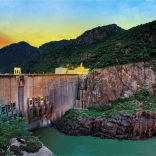Mozambique: HCB records net profit of 14 billion meticais - AIM
Mozambican organisations welcome resettlement of 1,500 people in LNG project

Civil society organizations yesterday welcomed the start of the resettlement of 1,500 people from the Afungi peninsula, the site of Mozambique’s first liquefied natural gas (LNG) plant. Resettlement operations began in November.
“The monitoring mission of the Civic Coalition on Extractive Industries found that in general, the process of implementing the Resettlement Plan on the Afungi Peninsula in this phase has been effective, open and transparent,” Tomás Vieira Mário, president of the Sekelekani Centre for Communication Studies and Research, said.
He was speaking at a press conference on behalf of the group which also includes the Centre for Public Integrity (CIP), the Centro Terra Verde (CTV), the Christian Council of Mozambique (CCM) and the Kuwuka-JDA Youth Development and Environment Association.
The five organisations are part of the Civic Coalition on Extractive Industries, which carried out a mission to the Afungi peninsula in January in which about 100 people were contacted, including representatives of the government and Anadarko, the American oil company that is heading the consortium in charge of the investment.
“The mission noted the existence of a more open and favourable socio-political environment for a more active participation of all relevant parties, including civil society organisations,” the organisations agreed yesterday.
Five recommendations resulted from the visit, two of which recommended improvements in communication between the parties, and the other three better articulation among the entities involved, more “fair and equitable” compensation criteria in land and garden plots and a search for ways to sustain the Milamba fishing community on the coast.
The coalition regrets that the ‘original sin’ of the proceeding has remained unresolved since 2012: the expropriation by the government of 7,000 hectares allocated to the LNG plant in favour of an Empresa Nacional de Hidrocarbonetos ( ENH) firm.
“We do not know in what context it does so, and this [firm] in turn cuts across” the whole area as a “cession of exploitation to the project” failing to compensate community areas, CIP member Fátima Mimbire said.
Today, each resident is compensated for what he personally loses, such as homes, gardens, access to the sea, when having to move to make way for the LNG plant, but damages for common spaces remain to be defined.
Anadarko is leading the group of companies that will exploit natural gas found under the seabed, 16 kilometres off the coast of Cabo Delgado province in the far north of Mozambique, near the border with Tanzania.
Once tapped, the gas will be piped to the industrial zone on the Afungi peninsula, where it will be converted into liquid and transported to freighter ships for export.
The plan provides for two land-based liquefaction lines with a production capacity of 12 million tonnes of LNG per year.
The consortium’s final investment decision is currently awaited. It has recently announced that it is closing sales contracts with an already-established price for the gas it will produce in Mozambique.
The consortium that operates Area 1 consists of the North American company Anadarko (26.5%), Japanese Mitsui (20%), India’s ONGC (16%), the Mozambican state oil company ENH (15%), along with two other Indian companies, Oil India Limited (4%) and Bharat Petro Resources (10%), and Thai PTTEP (8.5%).













Leave a Reply
Be the First to Comment!
You must be logged in to post a comment.
You must be logged in to post a comment.